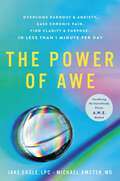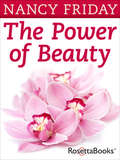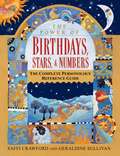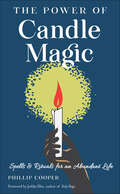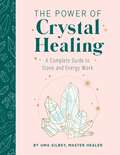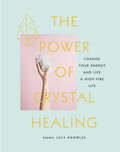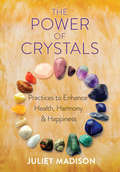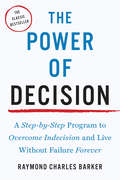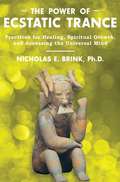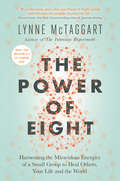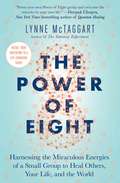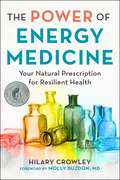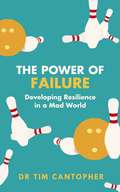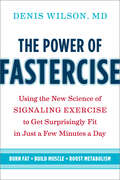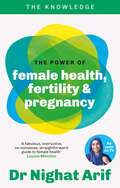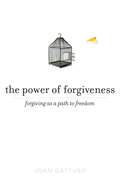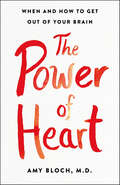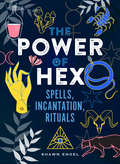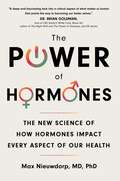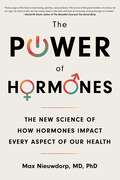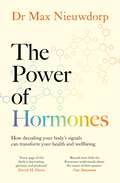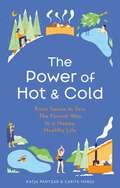- Table View
- List View
The Power of Awe: Overcome Burnout & Anxiety, Ease Chronic Pain, Find Clarity & Purpose—In Less Than 1 Minute Per Day
by Jake Eagle LPC Michael AmsterDiscover a clinically proven way to reduce inflammation, stress, loneliness, and burnout while improving overall well-being As lifelong meditators and mindfulness teachers, we confess we were almost embarrassed when we stumbled onto a 5–15 second shortcut to transcendence. This idea ran counter to everything we knew about meditation before we began our research. But, yes, it is possible. It only requires accessing the powerful emotion of awe in ordinary, everyday life. The changes in our lives have been profound, and after seeing the results repeated again and again in our thousands of patients, clients, and study participants, we&’ve proven that our shortcut, coined the A.W.E. Method, works. —from the Preface Research has proven that mindfulness improves well-being and reduces stress, anxiety, and pain. But for some, the practice itself feels challenging and inaccessible. That&’s where the A.W.E. Method comes in. In The Power of Awe, therapist Jake Eagle and chronic pain specialist Michael Amster, MD, share their extraordinary yet simple mindfulness practice that turns ordinary moments into awe-inducing experiences, helping you effortlessly achieve a heightened state of consciousness usually reserved for seasoned practitioners of mindfulness—all within a matter of seconds. A.W.E. stands for Attention, Wait, Exhale and Expand, and the method is a five- to fifteen-second, three-step process—a type of &“microdosing mindfulness,&” or a brief, informal mindfulness practice supported by research conducted at UC Berkeley. The A.W.E. Method quickly transports us into awe, an incredibly powerful emotion that produces wonderment and a heightened state of consciousness along with some remarkable changes in the mind and body that can improve health and wellness. Experiencing awe does not require any demanding discipline or skills or &“awesome&” settings. The A.W.E. Method ensures that awe and its many benefits are accessible to you at any time, in any place—sitting at a stoplight, cooking a meal, petting an animal, or listening to a loved one&’s laugh.
The Power of Beauty: Our Looks, Our Lives
by Nancy FridayReflections on how physical appearance, and beliefs about it, affect women&’s lives from a #1 bestselling author who&’s &“enormously fun to read&” (The New York Times). Beauty and appearance play a pervasive role in our culture. Here, the #1 New York Times-bestselling author of the groundbreaking, controversial bestseller My Secret Garden delves into beauty's influence on popular media and the psyche of modern women. Combining in-depth cultural analysis with personal anecdotes, sexology, and individual case studies, Nancy Friday explores the dissatisfaction women feel about their bodies—and how it affects their sexual freedom. Her analysis is broad-reaching, examining how popular culture, advertising, stereotypes of women in the workplace, the sexual liberation of the 1960s, and the dynamics of family relationships put pressure on women to live up to an impossible feminine ideal. Also published under the title Our Looks, Our Lives
The Power of Birthdays, Stars, & Numbers: The Complete Personology Reference Guide
by Saffi Crawford Geraldine SullivanThe most complete, comprehensive birthday forecast available--synthesizing the secrets of astrology, numerology, and fixed stars! In this delightfully addictive, wholly accessible book, two skilled astrologers guide you toward greater psychological insight, self-awareness, and a keen understanding of your unique position in the universe. Packed with an extraordinary wealth of knowledge and clear, easy-to-interpret graphs and charts, The Power of Birthdays, Stars and Numbers provides: ¸ BIRTHDAY FORECASTS--366 profiles--one for each day of the year--reveal your positive and negative personality traits, career strengths, tips on love and relationships, your secret self, your best days for romance and friendship, potential fatal attractions, famous people who share your birthday, and much more! INCLUDING! ¸ FIXED STARS--Though astrologers have used fixed stars for centuries, now the general public can reap the rewards of this classic method for enlightenment. The stars that line the heavens radiate great power, depending on your date of birth. You'll learn your primary fixed star plus those that influence your astrological chart. ¸ NUMEROLOGICAL PROFILES--Discover the importance of the nine basic numbers, and learn how to calculate your holistic number (which reveals your life purpose) and your personal year number (which sheds light on what specific lessons a particular year has in store for you). Travel beyond the twelve signs of the zodiac and tap into The Power of Birthdays, Stars and Numbers. You hold centuries of wisdom in your hands.
The Power of Candle Magic: Spells and Rituals for an Abundant Life
by Phillip CooperHere is a thoughtful, accessible, hands-on guide to the increasingly popular practice of candle magic. Author Phillip Cooper offers techniques for training your mind and working with the energy of candles. The Power of Candle Magic shows how the magical use of candle energy can brighten your attitude, help focus your attention, create abundance, help you with healing, and draw more love into your life. "The Power of Candle Magic contains practical information that can be put to excellent use by anyone. Transcending just burning candles, Cooper presents an entire system of magic with candle burning as its centerpiece. For those new to magical practice, Cooper's system is effective, and you may find it a good place to begin. For adepts or those already on their paths, pan for the gold within these pages: take what works for you and integrate it into your magic." —Judika Illes The book explains: • how to choose candles for magic • the basics of creating candle rituals • how to make and work with incense and anointing oils • the importance of color correspondences • how to use the planetary correspondences so you can harness the right energy for any endeavor Previously published as Candle Magic, this new edition includes an extensive new foreword by Judika Illes, author of Encyclopedia of 5,000 Spells and Pure Magic.
The Power of Crystal Healing: A Complete Guide to Stone and Energy Work
by Uma SilbeyThe Power of Crystal Healing will focus primarily on practical application of stones as a source of healing for afflictions ranging from fatigue to high blood pressure. Uma Silbey, applying her 40 years of experience, presents proven crystal and stone techniques that work to heal the body, mind, emotions, and spirit. Step-by-step instructions for both the beginner and the advanced show how to use crystals to help heal a diverse array of physical ailments like the flu and colds, cancers, nerve and blood disorders, migraine headaches, exhaustion, and stress, as well as emotional concerns like anger and depression, shame and guilt, loss, heartbreak, and finding love. The use of crystals to help heal common mental issues, such as anxiety and narcissism, OCD, suicidal ideation, PTSD, abusive behaviors, and self-harm, is also included. Though the use of crystals themselves can lead to a vastly expanded consciousness, the ability to &“feel&” or sense the vibrational fields that form the basis of all manifestation can help develop vast intuitive and psychic abilities and bring a deep sense of self. Specific techniques are given to help accelerate these processes. With easy-to-follow instructions, guidelines for building a personal &“Crystal Healing Kit,&” a diverse array of practices and powerful meditations, and over 100 beautiful pictures of the most powerful healing stones, this book will be an amazing first step for readers seeking a path of transformative healing.
The Power of Crystal Healing: Change Your Energy and Live a High-Vibe Life
by Emma Lucy KnowlesCrystals can transform your life, and this very contemporary guide shows you how to harness the power of these precious stones for healing. Change your energy and you can change your world. This beautiful, modern crystal bible features over 100 stones that can cleanse your mind, body, and spirit; improve your home life, charge your creativity, help you achieve your career goals, enhance your relationships, or fill every day with a little more positivity. See how to stock your crystal arsenal to kick butt at work, feel great, meditate, make your dreams come true, and so much more.
The Power of Crystals: Practices to Enhance Health, Harmony, and Happiness
by Juliet MadisonJust as people have different appearances, abilities, and characteristics, crystals possess their own special forms, attributes, and personalities. This beautifully illustrated guide reveals the power of crystals: how they work and how to choose the correct ones in order to employ their unique benefits.Filled with rich colorful photography, Juliet Madison's reader-friendly handbook is structured around the ways in which crystals can be used to improve specific life areas, such as health, abundance, career, romance, fertility, and family harmony. Individual chapters address the role of crystals in chakra balancing and establishing goals as well as their value in setting intentions and manifesting dreams. Additional applications include their use as jewelry and in creating displays, altars, and vision boards. This enlightening book uncovers the tremendous variety of ways in which the hidden powers of crystals can foster positive connections between your mind, body, and spirit.
The Power of Decision
by Barker Raymond CharlesIntroducing the first book in a powerful new series, The Tarcher Master Mind Editions: Essential Books of Inspiration, Instruction, and Motivation. What mind can conceive, man can achieve. Our decisions impact every area of our lives. Making better decisions means living a better life. But how can we develop the habit of making great decisions? Every noteworthy achievement the world has ever seen was born with a single thought; and every great man who ever lived has been a man of decision. Raymond Charles Barker's The Power of Decision reveals this principle of success and illustrates the process of choice that all of us must take-and that all of us are capable, this very second, of taking-to change our lives and make our dreams come true. Indecisive people are failure prone, and Dr. Barker examines this basic truth while exploring the decision-making process in the individual, and the role of the subconscious mind in either abetting or thwarting each of our conscious decisions. He provides specific steps to shift the balance of decision-making power in your favor, and he brings to light the constant, ever-present power of will to change a situation- and yourself-for the better. Picking up The Power of Decision is the moment; and reading it is the decision that will change your life forever. .
The Power of Ecstatic Trance: Practices for Healing, Spiritual Growth, and Accessing the Universal Mind
by Nicholas E. BrinkA guide to ecstatic trance for spiritual and emotional development, spirit journeying, and connection to the collective unconscious • Describes more than 20 ecstatic trance postures for healing, divination, spirit journeys, shape-shifting, past-life recovery, and connecting to the Akashic field • Explores the physiology and psychology of ecstatic trance journeying • Provides guidance for those with little or no experience as well as methods to deepen practice Over the millennia shamanic trance journeying has been used as a way of healing, of providing answers to questions, and of offering solutions to individual, family, and community problems. Though traditionally it was the shaman of the community who went on such journeys, the revolutionary work of the late anthropologist Felicitas Goodman shows that we all have these shamanic powers. Her research on the body postures found in ancient primitive art and in the practices of contemporary shamans offers each of us the ability to experience ecstatic trance journeys firsthand. A student of Felicitas Goodman and Belinda Gore, psychologist Nicholas Brink examines more than 20 traditional trance postures for divination, decision making, letting go of guilt and grief, healing of illness and emotional pain, spirit journeys, shape-shifting, interacting with animal spirits and the dead, and discovering past lives. Exploring the physiology and psychology of ecstatic journeying, he offers guidance for those with little or no experience as well as methods for longtime practitioners to deepen their practice and reclaim the extrasensory power of our ancient ancestors. Offering solid theories of how ecstatic trance triggers healing and spiritual development, Brink explains how trance journeying allows us to tap in to the collective unconscious, or Universal Mind, and access the information matrix of the Akashic field.
The Power of Eight: Harnessing the Miraculous Energies of a Small Group to Heal Others, Your Life and the World
by Lynne McTaggartWhat we send out into the universe comes back to us, magnified. Although the power of intention - the energy of positive thoughts - is widely accepted as an influential force in transforming lives, the exponential power of group intention has never been explored, until now. In The Power of Eight, Lynne McTaggart, an expert on the science of spirituality, reveals her remarkable findings from ten years of experiments about how group intention can heal our lives - and change the world for the better. When individuals in a group focus their intention together on a single target, a powerful collective dynamic emerges that can heal longstanding conditions, mend fractured relationships, lower violence and even rekindle life purpose. But the greatest untold truth of all is that group intention has a mirror effect, not only affecting the recipient but also reflecting back on the senders.Drawing on hundreds of case studies, the latest brain research, and dozens of McTaggart's own university studies, The Power of Eight provides solid evidence showing that there is such a thing as a collective consciousness. Now you can learn to use it and unleash the power you hold inside of you to heal your own life, with help from this riveting, highly accessible new book.
The Power of Eight: Harnessing the Miraculous Energies of a Small Group to Heal Others, Your Life, and the World
by Lynne MctaggartDiscover how to tap into your extraordinary human capacity for connection and healing, using astonishing new findings about the miraculous power of group intention and its boomerang effect, in this new book by the author of the international bestsellers The Intention Experiment and The Field. What we send out into the universe comes back to us, magnified. Although the power of intention—the energy of positive thoughts—is widely accepted as an influential force in transforming lives, the exponential power of group intention has never been explored, until now. In The Power of Eight, Lynne McTaggart, an expert on the science of spirituality, reveals her remarkable findings from ten years of experiments about how group intention can heal our lives—and change the world for the better. When individuals in a group focus their intention together on a single target, a powerful collective dynamic emerges that can heal longstanding conditions, mend fractured relationships, lower violence, and even rekindle life purpose. But the greatest untold truth of all is that group intention has a mirror effect, not only affecting the recipient but also reflecting back on the senders. Drawing on hundreds of case studies, the latest brain research, and dozens of McTaggart’s own university studies, The Power of Eight provides solid evidence showing that there is such a thing as a collective consciousness. Now you can learn to use it and unleash the power you hold inside of you to heal your own life, with help from this riveting, highly accessible new book. And you can join a series of worldwide Intention Experiments that will run on a major web television channel in 120 countries during the book’s initial publication and afterward.
The Power of Energy Medicine: Your Natural Prescription for Resilient Health
by Hilary CrowleyLearn how to unlock your own good medicine cabinet to discover the energy healing that will bring you health and joy.Hilary Crowley is the resident energy healer at a general family medical center in Portsmouth, New Hampshire. Working alongside surgeons, physicians, nurses, and holistic practitioners, she uses energy medicine modalities and hands-on techniques to facilitate her clients' healing. In this book, Hilary sheds light on questions surrounding energy medicine by sharing stories from cases including cancer battles, suicide attempts, and chronic pain. She shares how to find healing through the good medicines in your own cabinet: things like connection, grace, forgiveness, creativity, and more. In a healthcare system that has become increasingly focused on specialization and treating specific ailments or organs, the concepts of energy medicine and treating the whole patient are, unfortunately, often lost. Hilary aims to revolutionize the conversation about our body and spirit in the healthcare industry by speaking directly to patients and medical providers. Our bodies have the power to heal, and simply need guidance and awareness to access this vital energy for prevention and recovery. Through practical insights, inspiring stories, and thoughtful questions posed to the reader, this book is more than a guide to energy healing; it offers you the key to unlocking your good medicine cabinet and discovering holistic health and wellbeing.
The Power of Failure: Developing Resilience in a Mad World
by Tim Cantopher'A lovely read' - Jeremy Vine, BBC Radio 2Failure is your friend, your teacher, your passport to success - life lessons from one of the UK's most esteemed psychiatrists.Dr Tim Cantopher spent four decades helping people get better - get better psychologically, emotionally, mentally. He has guided hundreds of men and women through anxiety, depression, addiction and other mental health issues. In The Power of Failure, he will share with you some of the most powerful lessons learned from his life in the psychiatrist's chair, with the aim of helping you get more joy from your life, to become more resilient and to achieve more by no longer fearing failure. Navigating the pitfalls of vulnerability and perfectionism, Dr Cantopher will show you how optimism and resilience can change the outcome of challenging events, and how to find lasting happiness that won't be derailed by negative emotions such as shame or fear. As an expert on toxic and dysfunctional relationships, he will give strategies for surviving narcissistic or destructive behaviours in your family or friends, and explain the benefits of kindness, consistency, persistence and pacing. Bringing together a lifetime's work in psychiatry with unparalleled expertise and clinical insight, this new book from the bestselling author of Depressive Illness: The Curse of the Strong has the power to change your life in the same way that Dr Cantopher has changed the lives of the many hundreds of people who have sought his help over the years.
The Power of Failure: Developing Resilience in a Mad World
by Tim Cantopher'A lovely read' - Jeremy Vine, BBC Radio 2Failure is your friend, your teacher, your passport to success - life lessons from one of the UK's most esteemed psychiatrists.Dr Tim Cantopher spent four decades helping people get better - get better psychologically, emotionally, mentally. He has guided hundreds of men and women through anxiety, depression, addiction and other mental health issues. In The Power of Failure, he will share with you some of the most powerful lessons learned from his life in the psychiatrist's chair, with the aim of helping you get more joy from your life, to become more resilient and to achieve more by no longer fearing failure. Navigating the pitfalls of vulnerability and perfectionism, Dr Cantopher will show you how optimism and resilience can change the outcome of challenging events, and how to find lasting happiness that won't be derailed by negative emotions such as shame or fear. As an expert on toxic and dysfunctional relationships, he will give strategies for surviving narcissistic or destructive behaviours in your family or friends, and explain the benefits of kindness, consistency, persistence and pacing. Bringing together a lifetime's work in psychiatry with unparalleled expertise and clinical insight, this new book from the bestselling author of Depressive Illness: The Curse of the Strong has the power to change your life in the same way that Dr Cantopher has changed the lives of the many hundreds of people who have sought his help over the years.
The Power of Fastercise: Using the New Science of Signaling Exercise to Get Surprisingly Fit in Just a Few Minutes a Day
by Denis WilsonA revolutionary program of short burst, high-intensity exercise that uses your body's signals to curb hunger as it burns fat and builds muscleOver the last 26 years, thyroid pioneer Denis Wilson, MD, has trained thousands of physicians on the crucial relationships between the thyroid system, metabolism, and body temperature. He&’s heard patients recount their inability to get fit using conventional approaches, and he&’s understood their frustration. Based on the latest medical research, Dr. Wilson has created fastercise, a revolutionary practice that uses brief, strategically timed bursts of exercise to cancel hunger pangs, allowing people to more easily stick to a healthy eating plan and shift their bodies toward becoming leaner, faster, smarter, stronger, and healthier. Fastercise holds the promise of vindicating and liberating many of those who have struggled to improve their fitness, enabling them to transform their lives and reach their full potential.By combining simple analogies and clear explanations of the physiology of the body&’s energy pathways and response to food and exercise, Dr. Wilson reveals how conventional approaches to dieting and weight management can actually fight against the body&’s priorities and lead to frustration and poor results. Fastercise is a time-efficient, convenient, and natural approach powerfully signals the body to burn fat and build muscle synergistically, leading to surprisingly beneficial and quick results. The Power of Fastercise explains how fastercise can help you:• Burn fat without going hungry• Build your mitochondria to burn more fat and provide greater energy• Stimulate muscle growth in just a few minutes a day• Shift your body composition to less fat and more muscle• Boost your body temperature and metabolic rate• Look and feel younger• Increase mental focus, learning, and productivity• Decrease insulin resistance• Decrease inflammation and improve immune function• Improve respiratory fitness and athletic performance• Get great results with any healthy diet, including low-carb and high-carb In this groundbreaking book, Dr. Wilson lays out simple, practical strategies for combining fastercise with smart eating choices. Fastercise can provide excellent results for a wide range of people: seasoned athletes, fitness enthusiasts, and even those who dislike exercising or have physical limitations. Whatever your fitness goals are, fastercise can help you achieve them.
The Power of Female Health, Fertility & Pregnancy: The pocket guide to female health from one of TV's best loved doctors (The Knowledge)
by Dr Nighat ArifITV This Morning's GP Dr Nighat Arif brings you the essential guide to female health from puberty to menopause.This book tackles important topics including:- Planning for pregnancy, including specific advice for LGBTQ+ parents- How pregnancy affects your body and complications to know about- Facing infertility and your options, including medicine to improve fertility and assisted conception- Health concerns including endometriosis, polycystic ovary syndrome and gynaecological cancersThe Power of Female Health, Fertility & Pregnancy encompasses all experiences, including the perspectives of women of colour, people of all cultures, and the transgender community to ensure that all groups affected by female health concerns are a part of vital conversations.For all women and people assigned female at birth, whether you are navigating your pregnancy journey or exploring your symptoms and wondering what to check, when, this book covers everything you need to know.Content from this book previously appeared in the hardback edition of The Knowledge: Your Guide to Female Health from Menstruation to the Menopause
The Power of Female Health, Fertility & Pregnancy: The pocket guide to female health from one of TV's best loved doctors (The Knowledge)
by Dr Nighat ArifITV This Morning's GP Dr Nighat Arif brings you the essential guide to female health from puberty to menopause.This book tackles important topics including:- Planning for pregnancy, including specific advice for LGBTQ+ parents- How pregnancy affects your body and complications to know about- Facing infertility and your options, including medicine to improve fertility and assisted conception- Health concerns including endometriosis, polycystic ovary syndrome and gynaecological cancersThe Power of Female Health, Fertility & Pregnancy encompasses all experiences, including the perspectives of women of colour, people of all cultures, and the transgender community to ensure that all groups affected by female health concerns are a part of vital conversations.For all women and people assigned female at birth, whether you are navigating your pregnancy journey or exploring your symptoms and wondering what to check, when, this book covers everything you need to know.Content from this book previously appeared in the hardback edition of The Knowledge: Your Guide to Female Health from Menstruation to the Menopause
The Power of Forgiveness
by Joan GattusoHow can we forgive someone who has caused us pain?Must we forgive and forget?How does forgiveness help us move forward in life?How can we forgive ourselves and move forward in life?Joan Gattuso, bestselling author of A Course in Love, brings her wisdom to a topic that affects everyone--how to forgive when forgiveness seems impossible. Gattuso's practical and inspiring teaching serves as a compass to the spiritual principles that can transform bitterness into beauty and anger into peace. The road to forgiveness is the path to freedom. It is this freedom, she writes, that allows us to move forward, so that we can live a happy and joy-filled life. In The Power of Forgiveness, discover:* The ten principles of power over guilt, blame, and resentment* Practical ways to experience peace of mind* How to forgive authentically and let go of the past* The path to overcoming blocks blocks
The Power of Heart: When and How to Get Out of Your Brain
by Amy BlochThe secret to a good life is not what you think. Most of us have been raised to believe that we can solve any problem if we think about it hard enough. We spend years honing our intellect, knowing that our brains are our best line of defense against whatever roadblocks life throws us. But each and every one of us has a secret weapon to call upon when brainpower isn’t enough, and that is Heart. Amy Bloch discovered the power of heart quite by accident. An accomplished psychiatrist, fully in control of her professional and family life, Amy was dealt what she thought was a devastating, insurmountable set-back when her daughter Emily was born with a severe brain malformation. Amy tried desperately to “fix” Emily, and exhausted herself in her efforts to deal with the “problem” using her intellect, going at it brain-first—the default way we tend to approach challenges in our society. Emily, on the other hand, lives completely heart-first: she simply doesn’t have the capabilities to approach life brain-first. Yet to Amy’s initial surprise—and ultimately, to her great admiration—Emily is remarkably happy and successful. The Power of Heart is the distillation of what Emily taught Amy—lessons that are applicable to anyone’s life. Learning to be Emily’s mom and observing how Emily approaches life prompted a radical change in Amy’s life. It also transformed her work with patients in her professional practice, where she witnessed over and over again how getting out of brain and into heart made life deeper and richer, less stressful, and more meaningful. While the brain is amazing, powerful, and useful, it does come with limitations. There’s some stuff the brain just doesn’t know, which is where heart comes in. Tapping into heart helps your brain perform better, and makes you stronger and smarter than you will ever be trusting only your brain. Heart will allow you to live with uncertainty; find strength, resilience, courage, and persistence in tough times; cast off self-criticism and doubt, and have a lot more confidence and fun. The Power of Heart is for readers of all ages and walks of life who are ready to move beyond the brain-first strategy, and embrace heart as well.
The Power of Hex: Spells, Incantations, and Rituals
by Shawn EngelIn The Power of Hex, author Shawn Engel shows young women how to use their own power in an inclusive way, and empowers them to create their own spells with their new knowledge. Beginning with the definition of hexing, unpacking the ethics, and showing how disenfranchised groups have used this type of magic throughout history for protection, The Power of Hex leads into modern takes on the practice. From there, an overview of focusing energy in different rituals leads into four main spell chapters, rounding out to a chapter dedicated to building your own spells using aligned ingredients. This book sets itself apart because it aims to simplify this powerful type of magic while enforcing morality. We don't want to sink to the level of those we are cursing; hexing is meant to protect and arm. A beautiful, four-color design and illustrated guides introduce new witches to sigils, amulets, potions, and spells. Hex responsibly and effectively!
The Power of Hormones: The New Science of How Hormones Impact Every Aspect of Our Health
by Max NieuwdorpA fascinating, in-depth look at the crucial role that hormones play on human health at all ages and stages of our lives—written by one of the world&’s foremost experts.&“Hormones are the conductors of our body&’s orchestra.&” —Max Nieuwdorp Our hormones shape us at every stage of our lives, from the second we are conceived to the moment we breathe our last breath. They are essential to our immune system, sleep, digestion, hunger, stress levels, and so much more. When our hormone systems aren&’t functioning well, it wreaks havoc on our health and our wellbeing—and yet most of us know very little about the far-reaching power of the human body&’s crucial chemical messengers. Professor Max Nieuwdorp, an international authority on hormones, sets out to change this. He explores the role our hormones play from our early years through to puberty, pregnancy, and old age, combining stories from his day-to-day life treating his patients with the amazing, cutting-edge new science of hormones. These discoveries are changing the way that we understand our bodies, from the decline in male hormones during andropause to the new science on how gut bacteria affects our hormone balance. This eye-opening, myth-busting book shines a light on the incredible and under-explored role of hormones, which are essential not only to our health, but to our moods, our social interactions, and so much of what makes us who we are.
The Power of Hormones: The New Science of How Hormones Impact Every Aspect of Our Health
by Max NieuwdorpDecode the subtle signals of hormones with this foundational book from expert endocrinologist and leading researcher in the field. Hormones rule our lives. From conception, to birth, to our last breath, hormones control the delicate processes that keep our bodies in balance. However, when this careful stasis is disturbed, our hormones can wreak havoc on our health. Max Nieuwdorp, MD, PhD, knows exactly what signals your hormones are sending you and how they impact how you look, feel, and behave. In this foundational guide to hormonal health, he breaks down how hormones impact every system in the body, empowering you with the knowledge you need to get to the root of chronic health problems and set yourself up long lasting, sustainable wellness. Inspired by Dr. Nieuwdorp&’s day-to-day interaction with his patients, The Power of Hormones describes hormonal health in a detailed and accessible style, helping you clue in to symptoms of hormonal imbalance such as persistent fatigue and weight gain. His unique approach advocates for considering the far-reaching roles played by hormones throughout the body and is a go-to guide for understanding how they influence our health, our lives, and who we are.
The Power of Hormones: The new science of how hormones shape every aspect of our lives
by Max Nieuwdorp'Every page of this book is fascinating, glorious, and profound. This is one of the great frontiers of science for our age'Daniel M. Davis, author of The Beautiful Cure and The Secret Body _____________________________________________________________From a world-leading hormones specialist, the definitive book on the science of hormones and how understanding the secrets of our body&’s messengers can revolutionise our health and wellbeing Hormones are the messengers that drive every process in our body. They are essential to how we grow, fight disease and digest food; why we struggle to sleep, lose weight and manage stress – and so much more. When our hormones are imbalanced this can wreak havoc on our health, leading to conditions as far reaching as diabetes, infertility and heart disease. They also influence our personalities, how we feel and even the decisions we make. And yet for too long the power of our body&’s messengers has been overlooked. In this vital and myth-busting book, world-leading hormones expert Dr Max Nieuwdorp transforms our understanding of our bodies. Combining stories from his daily life treating his patients with amazing, cutting-edge new science, he reveals the crucial role that hormones play from our early years through to old age, exploring everything from the effect that smartphones have on our sleep and longevity to how our gut bacteria produce &‘happy&’ hormones. As Nieuwdorp reveals, hormones are central to our moods, our relationships and so much of what makes us who we are. Demystifying the signals of our bodies, he explores how we can rebalance our hormones for happier and healthier lives. _________________________________________________________ 'A delightfully readable book . . . A deep and fascinating look into a critical aspect of what makes us human and points the way to becoming our better selves' Dr. Brian Goldman, author of The Night Shift &‘The Power of Hormones reveals how little the Everyman understands about the extent of their power' New Statesman
The Power of Hot and Cold
by Katja Pantzar Carita HarjuThe sauna was recently ranked as the no.1 global wellness trend by the Global Wellness Summit. Cold-water swimming is a growing trend and is being proposed as a cure for all manner of things, from improving mental health to boosting immunity. But what exactly is hot and cold therapy & why is it important for physical and mental health?Dive into the unique world of hot and cold via Finland, where a good steam and an icy dip in a lake or the sea are the foundations of wellbeing for mind, body and soul.This definitive guide by two experts takes readers on a journey into the transformative powers of hot and cold by pairing the sauna, that quintessential hot Finnish steam bath, with a cold-water dip. Along the way, it serves up the inspiration and practical tools for creating a wellness retreat at home using the Nordic contrast bathing philosophy wherever you are in the world.The Finnish method of alternating hot and cold boosts happiness by increasing wellbeing and connecting with nature. It's the secret to how the world's happiest nation keeps calm and carries on - no matter what life throws at them.
The Power of Hot and Cold
by Katja Pantzar Carita HarjuThe sauna was recently ranked as the no.1 global wellness trend by the Global Wellness Summit. Cold-water swimming is a growing trend and is being proposed as a cure for all manner of things, from improving mental health to boosting immunity. But what exactly is hot and cold therapy & why is it important for physical and mental health?Dive into the unique world of hot and cold via Finland, where a good steam and an icy dip in a lake or the sea are the foundations of wellbeing for mind, body and soul.This definitive guide by two experts takes readers on a journey into the transformative powers of hot and cold by pairing the sauna, that quintessential hot Finnish steam bath, with a cold-water dip. Along the way, it serves up the inspiration and practical tools for creating a wellness retreat at home using the Nordic contrast bathing philosophy wherever you are in the world.The Finnish method of alternating hot and cold boosts happiness by increasing wellbeing and connecting with nature. It's the secret to how the world's happiest nation keeps calm and carries on - no matter what life throws at them.
